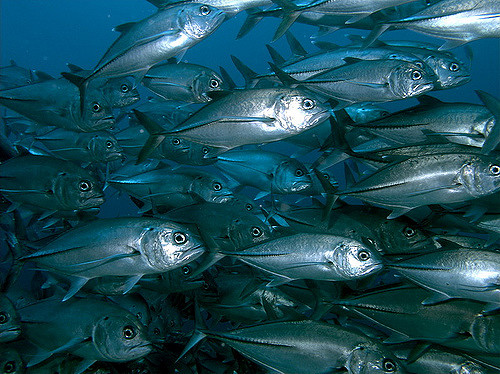
Credit: Tom Weilenmann, via Flickr)
Balanced Harvesting (BH) is a recently proposed approach to fisheries management, and it is touted as a reliable way to preserve ecosystem structure while increasing fisheries catches.
However, many within the scientific community are calling into question the empirical and moral grounds behind such an endeavor.
The logic behind BH follows as such: When fishing pressure is spread across all components of an ecosystem, and targets all taxa depending on their size and productivity – rather than focusing on a few selective species – then the functional structure of that ecosystem is kept intact. This, the theory goes, preserves abundance for future use.
In a paper published in the ICES Journal of Marine Science (Froese et al. 2015), in collaboration with the Sea Around Us, researchers investigated the merits of this theory.
After analyzing several of the methods used in BH research amongst other variables, the authors found “the models used unrealistic assumptions and settings, and that conclusive empirical evidence of BH is lacking.”
With BH, the relative size and species composition of an ecosystem is supposed to be maintained. To do this, fishers would have to catch smaller fish – and moreover, fish that people don’t eat, in order to keep the ecosystem in balance.
Because much of the new catch would consist of these small fish, a large proportion of them would be used as fishmeal for the aquaculture industry. This would be a drastic change from current practices where fisheries try to protect smaller and younger fish in order to maintain reproduction rates.
Moreover, increasing fishing pressure on smaller species and smaller (i.e., younger) individuals of larger species could potentially deplete food consumed by higher trophic predators.
Or, as lead author Rainer Froese writes: “If we wish big fish, we must leave prey for them to feed on.”
Furthermore, the ecosystem is made up of a wide spectrum of other species, many of which are not currently caught, but under BH, would have to be caught.
Using BH would mean that to maintain ecosystem integrity, other creatures – like seabirds, seals, whales, dolphins, and even zooplankton – would have to be targeted regardless of demand. Catching these non-target species would become a “scientific requirement of ecosystem-based fisheries management under BH,” Froese writes.
In a more recent paper published in April 2016 (Pauly et al. 2016), Froese, Sidney Holt, and lead author Daniel Pauly argue that BH not only lacks a firm empirical foundation, but it contradicts a stated mission of the Food and Agricultural Organization of the United Nations (FAO).
In the FAO’s own ‘Code of Conduct for Responsible Fishing,’ it stresses selective fishing, stating in one section: “In order to improve selectivity, states should, when drawing up their laws and regulations, take into account the range of selective fishing gear, methods and strategies available to the industry.”
Finally, lead author Pauly discusses a “growing circle of empathy,” whereby there is an understanding that non-human species can have intrinsic rights and value. Many organizations already implicitly acknowledged these. The FAO’s ‘Code of Conduct for Responsible Fishing’ looks to reduce anthropogenic causes of mortality for non-targeted species, and the International Union for Conservation of Nature maintains a ‘Red List of Threatened Species.’
Therefore, a fishing practice like BH, which promotes an approach to fishing that demands the exploitation of all groups in an ecosystem, runs contrary to this growing global awareness and perspective.
“Deliberately increasing anthropogenic mortality across the widest possible range of species would be a huge backward step,” writes Pauly.
References:
Froese, R., C. Walters, D. Pauly, H. Winker, O.L.F. Weyl, N. Demirel, A.C. Tsikliras, and S. Holt (2015) A critique of the balanced harvesting approach to fishing. ICES Journal of Marine Science http://dx.doi.org/10.1093/icesjms/fsv122.
Pauly, D., R. Froese, and S.Holt (2016) Balanced harvesting: The institutional incompatibilities. Marine Policy 69: 121-123.

